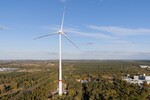03/11/2004
The fight for wind energy is on in Germany
The law of supply and demand will make subsidizing non-fossil electricity generation obsolete after companies start trading emissions certificates next year, independent advisors to the economics ministry said in a report released on Thursday. This may stymie plans by the environment ministry to pass draft legislation that would double the amount of these subsidies between 2005 and 2010, although the ministry indicated it would go ahead with the bill.
Subsidizing non-fossil electricity generation is expensive and would not bring an additional reduction in carbon dioxide emissions after industrial plants and electricity generators began trading emissions certificates next year, the report concludes.
The subsidies, the advisors said, would prompt the construction of new power generators running on biomass, wind power, hydropower and other regenerative sources. This would increase the supply of carbon dioxide certificates on the market, thus causing the price for these certificates to fall to the point where a balance between supply and demand is reached. As a result, all emissions certificates will be used; exactly the same amount of carbon dioxide will be released whether or not subsidized non-fossil electricity generation is continued,the report says.
Under the current law, electricity distributors must purchase electricity from plants running on non-fossil fuels at a mark-up. This extra cost is passed on to the customer. The environment ministry said the current law would give alternative energy sources a chance to gain a foothold in the market. Eligible for subsidies are hydropower, solid waste power, biomass, geothermal energy, solar energy and windmills.
The government plans to double subsidies to these plants running on these energy sources by 2010, increasing their overall share to 12.5 percent. The advisory panel said this would cost energy users EUR5 billion a year in 2010 or EUR0.8 a kilowatt hour, adding around one-third to electricity bills. These subsidizes would effectively subsidize companies that produce carbon dioxide outside of the German power generation sector. The environment ministry said the independent advisors should have considered issues such as securing Germany's energy supply and saving natural resources. “Current legislation on renewable energy and the draft legislation currently on the table will create the necessary stimulus for this,“ environment ministry spokesman Michael Schroeren said. Schroeren refused to comment on the report's major findings, however. The report also said that most forms of non-fossil electricity generation are worthless to distributors, since their production is dependent on the weather and cannot be produced in times of need.
Subsidizing non-fossil electricity generation is expensive and would not bring an additional reduction in carbon dioxide emissions after industrial plants and electricity generators began trading emissions certificates next year, the report concludes.
The subsidies, the advisors said, would prompt the construction of new power generators running on biomass, wind power, hydropower and other regenerative sources. This would increase the supply of carbon dioxide certificates on the market, thus causing the price for these certificates to fall to the point where a balance between supply and demand is reached. As a result, all emissions certificates will be used; exactly the same amount of carbon dioxide will be released whether or not subsidized non-fossil electricity generation is continued,the report says.
Under the current law, electricity distributors must purchase electricity from plants running on non-fossil fuels at a mark-up. This extra cost is passed on to the customer. The environment ministry said the current law would give alternative energy sources a chance to gain a foothold in the market. Eligible for subsidies are hydropower, solid waste power, biomass, geothermal energy, solar energy and windmills.
The government plans to double subsidies to these plants running on these energy sources by 2010, increasing their overall share to 12.5 percent. The advisory panel said this would cost energy users EUR5 billion a year in 2010 or EUR0.8 a kilowatt hour, adding around one-third to electricity bills. These subsidizes would effectively subsidize companies that produce carbon dioxide outside of the German power generation sector. The environment ministry said the independent advisors should have considered issues such as securing Germany's energy supply and saving natural resources. “Current legislation on renewable energy and the draft legislation currently on the table will create the necessary stimulus for this,“ environment ministry spokesman Michael Schroeren said. Schroeren refused to comment on the report's major findings, however. The report also said that most forms of non-fossil electricity generation are worthless to distributors, since their production is dependent on the weather and cannot be produced in times of need.
- Source:
- Online editorial www.windfair.net
- Author:
- Trevor Sievert, Online Editorial Journalist
- Email:
- press@windfair.net
- Keywords:
- Germany, subsidies, wind energy, wind power, wind turbines

























